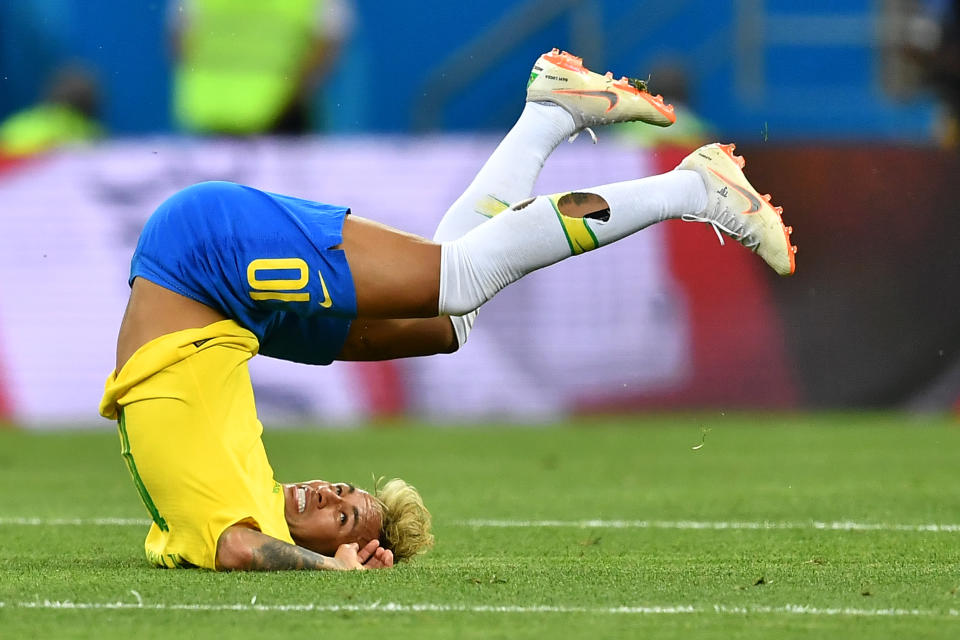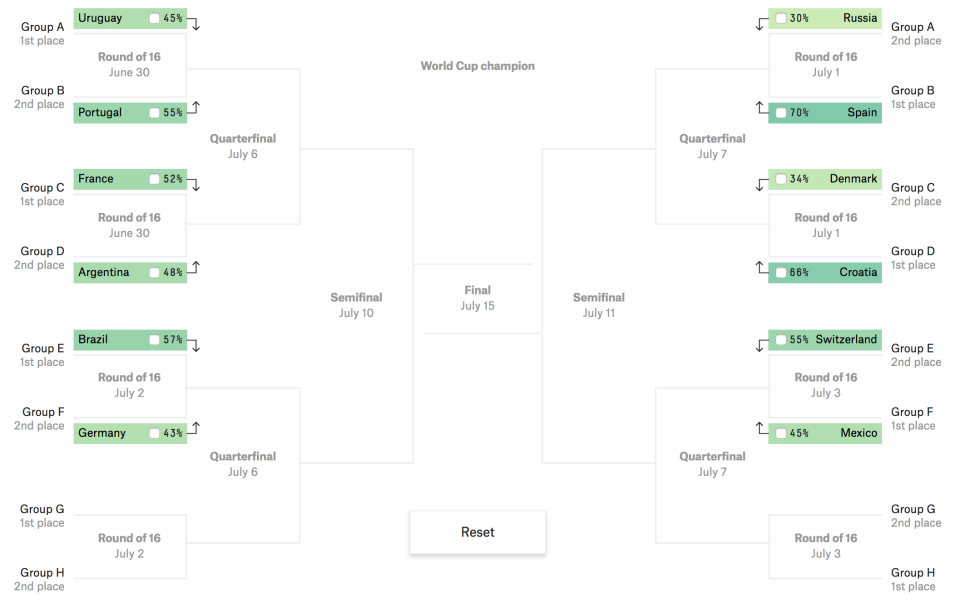World Cup teams could have incentive to lose this week. Should they?
It is known as the Disgrace of Gijon. It’s the reason World Cup group deciders are now simultaneous and dizzying. And it might be the only case in World Cup history of a team losing on purpose.
Austria and West Germany went into the final day of group play at the 1982 World Cup knowing that a German win by one or two goals would advance both and eliminate Algeria. So, after a 10th-minute German goal, the two sides engaged in an absurd 80-minute charade. The Austrians, knowing a three-goal loss would knock them out, let West Germany have its crucial lead. The Germans, in exchange, barely tried to extend that lead. Fans howled in displeasure and disbelief.
It’s the most prominent and oft-cited example of perverse incentives dictating a controversial World Cup result. And it’s relevant – kind of – because backwards motives could arise once again in 2018.

But these ones are different. Whereas Austria accepted a less than ideal result to avoid a disastrous one in ’82 – just like Denmark, in a less egregious way, did Tuesday – the likes of England, Belgium and Switzerland might be better off actively playing for worse results on Wednesday and Thursday.
Which begs a few questions: Should they? Will they? And why would they?
Why losing (or drawing) could be beneficial
The answer, essentially, is Mexico over Germany.
Group stage upsets, and most importantly that rousing Mexican victory, have pieced together a projected knockout round bracket that is wildly unbalanced. If the likeliest scenarios come to fruition, Uruguay, Portugal, France, Argentina, Brazil and Germany will populate the upper three-quarters of the left side. The right will feature Russia, Spain, Croatia, Denmark, Switzerland and Mexico.

Eight of our pre-tournament top 10 – boasting 15 World Cup titles and the most recent European crown – could find themselves clustered in a “Bracket of Death.”
So teams in Group E and G, whose winners go left, might be better off finishing second. Brazil, for example, might want to avoid a Round of 16 bout with the reigning champs. But that’s what Group E’s top spot will get the Brazilians if Germany comes out of Wednesday’s early games second in Group F.
And if that titanic battle does materialize, the following day, England and Belgium will meet in a head-to-head battle for first place knowing either Brazil or Germany would be waiting in the quarters. The Group G runner-up spot, on the other hand, would turn the team that claims it into a semifinal favorite.
The strange England-Belgium situation is contingent on Wednesday’s results. But both could be better off losing. If they draw, with goal differential and goals scored even, the tiebreaker would be fair play, meaning both could have incentive to accumulate yellow and red cards. That could lead to one of the most bizarre matches in World Cup history.
Is there precedent for losing on purpose?
To our knowledge, no – no team has ever taken a World Cup field with the objective of losing.
But there absolutely is precedent for group-concluding losses proving beneficial – and debunking the myth of momentum.
West Germany certainly couldn’t afford to throw its Matchday 3 game against East Germany in 1974, for its players would have been unable to show their faces in public ever again. But a 1-0 East German upset didn’t hinder the West on its run to a World Cup title; and it might have helped.
Already assured of a place in the second group stage, West Germany could have topped Group 1 with a win or draw in the politically charged German derby. Instead, it lost, and slipped to second – which meant it eventually avoided a second-round group featuring Brazil, Argentina and the Netherlands. Instead, it got Poland, Sweden and Yugoslavia. It beat all three, then beat the Dutch in the final.
The format in ’74 was different than it is today. But the concept – that a group stage loss gave West Germany a cleaner route to glory – is similar.
How could a team lose on purpose?
The issue, of course, is that a team can’t just put the ball in its own net, even if doing so would boost its knockout round prospects. Technically it could. But it might risk punishment at FIFA’s discretion. And the public outcry would be overwhelming. The favorable draw isn’t worth the infamy.
The question then becomes, where do you draw the line? Would a coach tell his players to underperform? Surely not. But could he perhaps instruct them to throw in the towel with 20 minutes remaining if the opponent has a lead? Even that might be a step too far. But it might not be.
There are a few infallible ploys. England and Belgium, for example, should play full reserve teams. No outfield player who’ll start in the Round of 16 should see the field for more than a 45-minute training session. Those who are on yellow cards or carrying injuries, however minor, shouldn’t even dress.
And there are in-game strategies that are acceptable. Actively trying to concede a goal might not be one of them, but refraining from scoring when down a goal or level? That should be considered.
What should Brazil and Switzerland do?
Switzerland is in a unique spot: It can guarantee a second-place finish – no better, no worse – with a draw. And second place might be ideal.
Now, it might not be able to afford a loss if Serbia gets a result against Brazil. So it can’t roll out a complete B-team. But irrespective of the Brazil-Serbia score, Switzerland can and should play for a draw if it finds itself in position to do so in the second half against Costa Rica.
Brazil, on the other hand, can’t really play for a draw, because a fluky last-minute Serbia winner could eliminate the Selecao altogether. But with goal differential potentially a factor, if the Brazilians are up a goal late in Wednesday’s match, they should play conservatively.
If, that is, Germany has finished second in Group F. Just remember: All of this depends on Wednesday’s early games. If, say, Germany wins Group F and Sweden finishes second, all of what you’ve just read goes out the window. And the same goes for Group G below.
What should England and Belgium do?
It is neither fair nor reasonable to expect professional players – especially those who might be making maiden World Cup appearances – to play at less than 100 percent. So it’s not really possible for managers Gareth Southgate or Roberto Martinez to set their team up to lose.
As mentioned, though, neither should play his strongest team. Neither side should be using intricate set plays on free kicks or corners. They probably shouldn’t even be going all-out attack if they find themselves facing a deficit.
And it absolutely is reasonable for reserves who aren’t at risk of suspension to take yellow cards. Players have done so in the past for other reasons. England currently leads – or trails – Belgium two yellow cards to three on the fair play tiebreaker. Let’s say that has evened out to 4-4 in the 90th minute Thursday, with the game at 1-1. As preposterous as it sounds, Jamie Vardy should go flying into a tackle or two. Or punt the ball away in dissent. Or at least call the ref a “f—ing w—–.” It could prove to be the most important vulgar insult in World Cup history.
– – – – – – –
Henry Bushnell covers global soccer for Yahoo Sports. Have a tip? Question? Comment? Email him at henrydbushnell@gmail.com, or follow him on Twitter @HenryBushnell, and on Facebook.


